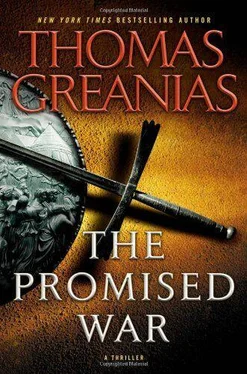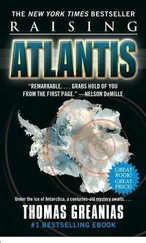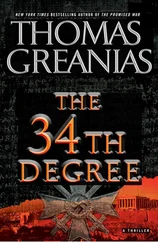Thomas Greanias - The Promised War
Здесь есть возможность читать онлайн «Thomas Greanias - The Promised War» весь текст электронной книги совершенно бесплатно (целиком полную версию без сокращений). В некоторых случаях можно слушать аудио, скачать через торрент в формате fb2 и присутствует краткое содержание. Жанр: Триллер, на английском языке. Описание произведения, (предисловие) а так же отзывы посетителей доступны на портале библиотеки ЛибКат.
- Название:The Promised War
- Автор:
- Жанр:
- Год:неизвестен
- ISBN:нет данных
- Рейтинг книги:5 / 5. Голосов: 1
-
Избранное:Добавить в избранное
- Отзывы:
-
Ваша оценка:
- 100
- 1
- 2
- 3
- 4
- 5
The Promised War: краткое содержание, описание и аннотация
Предлагаем к чтению аннотацию, описание, краткое содержание или предисловие (зависит от того, что написал сам автор книги «The Promised War»). Если вы не нашли необходимую информацию о книге — напишите в комментариях, мы постараемся отыскать её.
The Promised War — читать онлайн бесплатно полную книгу (весь текст) целиком
Ниже представлен текст книги, разбитый по страницам. Система сохранения места последней прочитанной страницы, позволяет с удобством читать онлайн бесплатно книгу «The Promised War», без необходимости каждый раз заново искать на чём Вы остановились. Поставьте закладку, и сможете в любой момент перейти на страницу, на которой закончили чтение.
Интервал:
Закладка:
"To probe my memories?"
"That's right. Make you talk in your sleep and extract what you knew about the fail-safe under the Temple Mount."
Deker felt empty, hollowed out, spiritless. "What's going to happen to me?"
"Fortunately, they didn't accidentally blind you, and you seem to have escaped permanent brain damage," Packard told him. "But we really don't know what the long-term effects are of infecting someone's brain with a virus that makes it susceptible to light."
Deker was quiet, thinking. "Last night I thought I woke up for a few seconds and saw my dead driver, Stern, by my bedside."
"Hmm, that's interesting," Packard said. "Like I said, we really don't know the long-term impact of your torture."
Deker asked, "So, what happens to me now?"
"You broke under torture and gave up the fail-safe. Now your superiors have come to realize that Jerusalem's only real fail-safe is the good ol' U.S.A."
"More than a few in the IDF would beg to differ," Deker said. "Israel has God on her side."
"God can't help you now, Deker. Because the IDF wants you out, one way or another. You know too much and are an embarrassment in the current political climate. So you've been dishonorably discharged to our care."
"To do what with my life?"
"That's up to you," Packard said. "When you figure it out, let me know, because we could use a man like you back home in the States."
Home.
"I have no home anymore."
"Then you'll fit right in," Packard said, and left the room.
52
The official maps that Deker had obtained after his hospital discharge a week earlier proved worthless as he drove out in the heat from Jericho. All he had to show after three fruitless days of sifting through the sands of time were a few chips from the modern city's Oasis Casino and a hangover from too much drinking. He had already visited several other "Gilgals" around the area, tourist traps all, but none resembling the real Gilgal.
The real Gilgal.
Deker couldn't tell what was real and what wasn't anymore. Did he really take a trip through time? Or did he simply trip out on military-grade hallucinogens and live to remember it?
Still, an archaeological tour of one of those Neolithic sites along the Jordan River with a group called the Friends of the Earth had given him an idea. That site had been dug some twenty years earlier by a team from the Israel Museum and had unearthed thirteen round buildings made of mud and rock, along with agricultural facilities, including grinding stones, pounding stones, axes and sickle blades. Most interesting was a silo containing a sizable amount of wheat and barley-a fleeting image he recalled that one night in the real Gilgal.
He looked at his Landsat thematic map of the area that also included Shuttle Radar Topography Mission topographic data. It was a gift from the chief archaeology officer in the IDF's civil administration. The officer told him that this same space technology had led to the discovery of the lost city of Ubar in present-day Oman and the ancient desert frankincense trade route in southern Arabia. He only asked that if Deker actually found something, he'd let the IDF know.
The only thing Deker had found so far came from the pages of Jewish history and tradition. From multiple sources he was able to piece together a general picture of what happened to Rahab and the rest he had met back in time or in his mind. He played the scenario over and over like a movie while he searched for Gilgal.
Rahab and her family were indeed spared death and allowed to live outside the Israelite camp at Gilgal. She almost immediately married Salmon, the son of Nahshon. Rahab shortly thereafter gave birth to a son they named Boaz. Deker wasn't quite sure what to make of that, and for the time being buried it in his heart. When Boaz had grown, he married a woman named Ruth and they had a son, Obed, who had a son named Jesse, who had a son named David.
David became the king of Israel, fulfilling the prophecy of the six-pointed conjunction of stars in the heavens that Rahab had pointed out to Deker that night on her terrace so long ago. Fourteen generations later, from the line of David, came Jesus, whom his Roman executioners called the "King of the Jews" and whose cousin John the Baptist called the "Passover Lamb" who would take away the sins of the world.
Tracing Rahab's bloodline to Christ made Deker think back to the scarlet cord in Rahab's window, and to her faith that Yahweh would "pass over" her sins as the Angel of Death had passed over the Hebrew slaves in Egypt. Her faith had been rewarded, and so had Salmon's.
But would his? Deker wondered.
Salmon's curious friend Achan bin-Zerah wasn't as fortunate. He apparently had defied General Bin-Nun's herem,or ban, on keeping any spoils from Jericho by pocketing two hundred shekels of gold and silver during the pillage instead of turning them over to the Treasury of Yahweh. Bin-Nun figured this out days later when he sent a small unit of thirty-six troops drawn from a single division to capture the town of Ai. A small and easy target compared to Jericho, to be sure, but the Israelites were ambushed and killed. After another face-to-face meeting with Yahweh, Bin-Nun used a mass form of divination-casting lots-to identify Achan as the cause, and had him stoned to death along with his wife, children, sheep and every breathing thing he owned. Then Bin-Nun had them burned and buried under the pile of rocks used to kill them.
From then on, Joshua, the son of Nun, moved from one victory to another in his quest to claim the Promised Land for Israel from the Jordan River to the Mediterranean Sea. He split Canaan in two, first taking out the southern kingdoms before turning his attention to the more powerful northern kingdoms. He even gave Phineas a sign to remember forever when, according to the book of Joshua, the sun stood still for an extra day so the Israelites could kill more enemies in a decisive victory. Only Jerusalem remained untaken.
Deker knew that Bin-Nun's plan to cut the land of Canaan in half was the very strategy that modern Israel's Arab enemies had long harbored for wiping the Jewish state off the map. To avoid such a fate while he was in charge, Bin-Nun focused on defending Israel's moral boundaries even more than her natural ones. He was especially concerned about the threat of other religions in Canaan, which ultimately came to roost with King Solomon, who for all his wisdom allowed the influence of his many foreign wives to persuade him to turn the six-pointed Star of David into the official emblem of the state.
"But as for me and my family," Joshua bin-Nun proudly declared, "we will serve the Lord."
Finally, before he died, Bin-Nun signed a treaty in which Israel pledged to honor other nationalities in Canaan who honored Yahweh. He signed it at Shechem, the place where God first promised Abraham the land of Canaan.
Surely this must have pleased Rahab.
Reading through these historical documents, Deker had even begun to at least understand the rationale behind Bin-Nun's strategy of incinerating entire cities and every man, woman, child and animal that breathed inside their walls. Due to the tuberculosis the doctors had discovered in his lungs at Hadassah Medical Center, Deker did some research and learned that archaeologists had also discovered history's earliest evidence of TB in ancient bones buried under Jericho. Such airborne diseases were rampant in ancient times. Israel, therefore, faced an existential threat any time she came into contact with her enemies. Incineration was the only insurance to counter the threat in that age.
So at least Bin-Nun had had his reasons. And so, perhaps, did Israel today.
All the same, Deker knew he would never be able to erase from his mind that first horrific glimpse of twenty-four thousand blackened corpses strung out among a golden sea of shittah trees.
Читать дальшеИнтервал:
Закладка:
Похожие книги на «The Promised War»
Представляем Вашему вниманию похожие книги на «The Promised War» списком для выбора. Мы отобрали схожую по названию и смыслу литературу в надежде предоставить читателям больше вариантов отыскать новые, интересные, ещё непрочитанные произведения.
Обсуждение, отзывы о книге «The Promised War» и просто собственные мнения читателей. Оставьте ваши комментарии, напишите, что Вы думаете о произведении, его смысле или главных героях. Укажите что конкретно понравилось, а что нет, и почему Вы так считаете.












